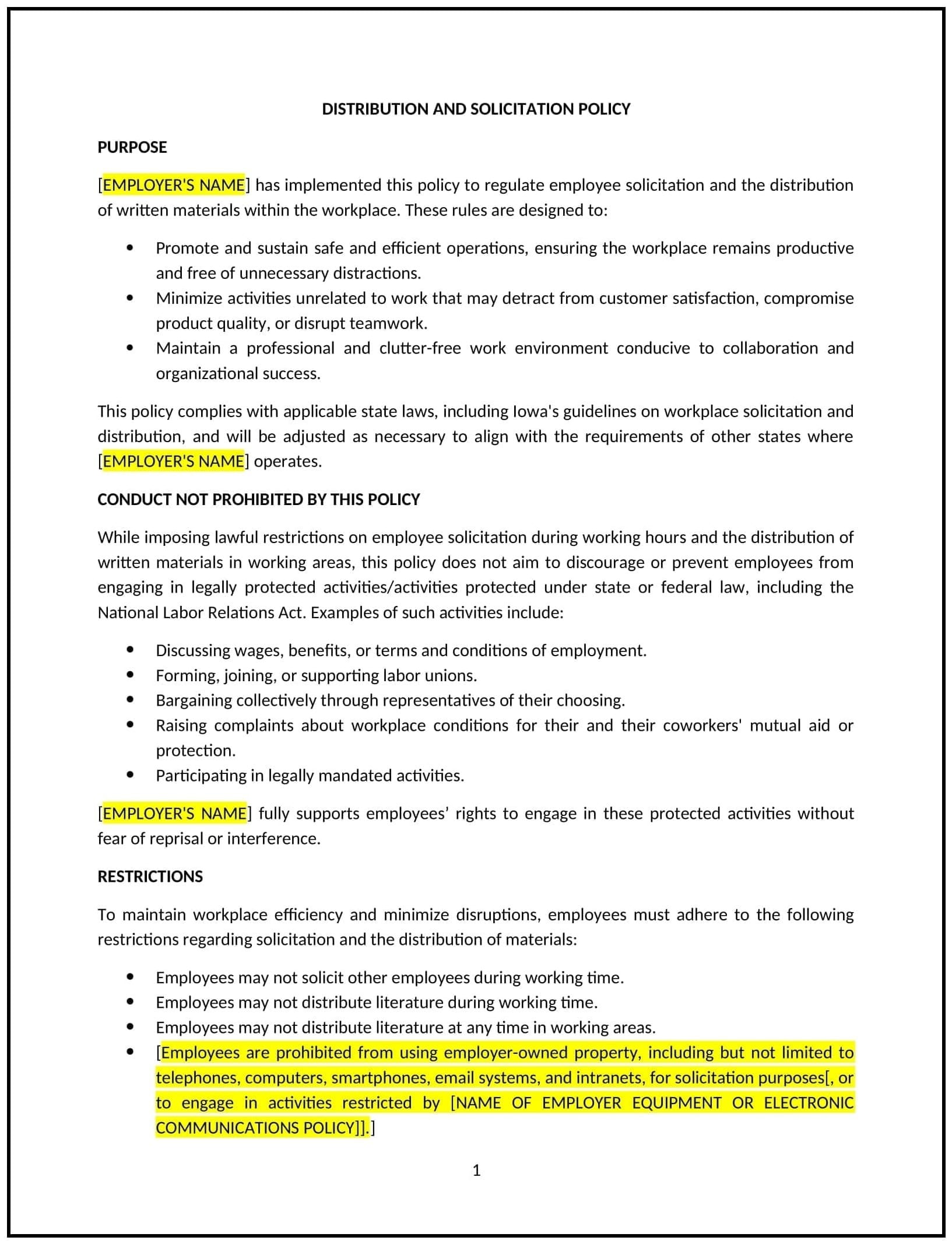Distribution and solicitation policy (Iowa): Free template
Got contracts to review? While you're here for policies, let Cobrief make contract review effortless—start your free review now.

Customize this template for free
Distribution and solicitation policy (Iowa)
A distribution and solicitation policy helps Iowa businesses set clear guidelines for distributing materials and soliciting support, donations, or sales in the workplace. Unregulated distribution and solicitation can disrupt productivity, create discomfort among employees, and interfere with business operations.
This policy establishes rules on when and where solicitation or material distribution is allowed, ensuring a balanced work environment that respects both employee rights and business efficiency. It also addresses non-employee solicitation and how businesses should handle external requests.
By implementing this policy, businesses in Iowa can minimize workplace disruptions, maintain a professional environment, and provide clear expectations for employees and third parties.
How to use this distribution and solicitation policy (Iowa)
- Define solicitation activities: Specify which types of solicitation are covered, such as sales promotions, political advocacy, or charitable fundraising.
- Establish employee guidelines: Outline when and where employees can engage in solicitation or distribution without disrupting work operations.
- Set rules for non-employees: Restrict outside vendors, organizations, or individuals from soliciting employees or distributing materials on business premises.
- Address digital solicitation: Establish expectations for solicitation through company email, messaging platforms, or internal communication tools.
- Allow for approved charitable activities: Provide guidelines for employer-approved fundraising or donation drives.
- Ensure fair application: Apply the policy consistently across all employees and departments.
- Provide reporting procedures: Designate a process for employees to report violations or concerns regarding solicitation activities.
- Review and update: Regularly assess the policy to reflect workplace needs and potential changes in business operations.
Benefits of using this distribution and solicitation policy (Iowa)
This policy offers several advantages for Iowa businesses:
- Maintains workplace productivity: Reduces unnecessary interruptions and distractions during work hours.
- Prevents discomfort among employees: Establishes clear boundaries for solicitation and distribution activities.
- Protects company resources: Limits the use of business communication tools for non-work-related solicitations.
- Ensures a professional work environment: Promotes a culture where employees can focus on job responsibilities.
- Provides fair and consistent enforcement: Prevents favoritism or selective application of solicitation rules.
- Reduces external disruptions: Restricts third-party solicitations that could interfere with business operations.
Tips for using this distribution and solicitation policy (Iowa)
- Define permitted activities: Businesses should clarify what types of solicitations are allowed, such as employer-sponsored charitable events.
- Establish designated solicitation areas: Businesses should identify locations where approved solicitation activities can take place without disrupting work.
- Address digital solicitation: Businesses should set clear guidelines for the use of company email and messaging tools for non-business purposes.
- Communicate expectations clearly: Businesses should ensure employees understand solicitation rules through handbooks and training.
- Provide a process for exceptions: Businesses should establish a method for requesting approval for special solicitation or fundraising activities.
- Monitor policy effectiveness: Businesses should review employee feedback and workplace impact to adjust the policy as needed.